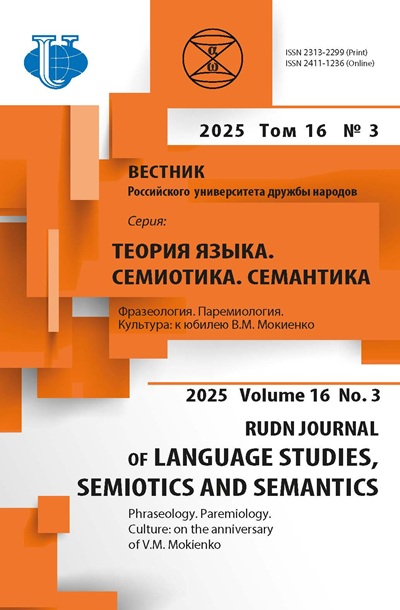ОТРАЖЕНИЕ ЭТНОКУЛЬТУРНЫХ ЦЕННОСТЕЙ В ПОСЛОВИЦАХ ФРАНКОЯЗЫЧНЫХ СТРАН
- Авторы: Нелюбова Н.Ю.1
-
Учреждения:
- Российский университет дружбы народов
- Выпуск: Том 10, № 2 (2019)
- Страницы: 323-335
- Раздел: ФРАЗЕОРЕСУРСЫ
- URL: https://journals.rudn.ru/semiotics-semantics/article/view/21752
- DOI: https://doi.org/10.22363/2313-2299-2019-10-2-323-335
- ID: 21752
Цитировать
Полный текст
Аннотация
Статья посвящена анализу ценностных ориентиров носителей французского языка, проживающих на территории Франции и за ее пределами. Актуальность данной проблематики объясняется антропоцентрической направленностью современной лингвистической науки, изучением языковых фактов в тесной связи с фактами культуры и их взаимного влияния, а также отсутствием специальных работ, посвященных сопоставлению ценностных ориентиров различных носителей полинационального французского языка. Целью статьи является выявление основных ценностей представителей различных франкоязычных стран на основе тематически организованного пословичного материала, представленного в лексикографических источниках. В ходе исследования применялись методы сопоставительного, статистического анализа, материал получен путем сплошной выборки из специального словаря французских пословиц и поговорок и составил 2041 единицу. Проведенное исследование показало, что для всех носителей французского языка, проживающих как во Франции, так и за ее пределами, в большей степени характерна ориентированность на материальные, а не духовные ценности. Особенности французских пословиц в каждой из стран отражают этноспецифические исторические, географические и социолингвистические факторы и условия.
Об авторах
Наталия Юрьевна Нелюбова
Российский университет дружбы народов
Автор, ответственный за переписку.
Email: neliubova-nyu@rudn.ru
кандидат филологических наук, доцент, доцент кафедры иностранных языков филологического факультета РУДН
Ул. Миклухо-Маклая, 6, Москва, Россия, 117198Список литературы
- Алефиренко Н.Ф. «Живое» слово: Проблемы функциональной лексикологии: монография. М.: Флинта: Наука, 2009.
- Гумбольдт В. Избранные труды по языкознанию. М.: Прогресс, 1984.
- Карасик В.И., Ярмахова Е.А. Лингвокультурный типаж «английский чудак». М.: Гнозис, 2006.
- Пименова М.В. Методология концептуальных исследований // Антология концептов / под ред. В.И. Карасика, И.А. Стернина. Т. 1. Волгоград: Парадигма, 2005.
- Мамонтов А.С., Цэдэндоржийн Э., Богуславская В.В. Система ценностей в аспекте национально-ориентированной лексикографии (на примере русско-монгольских сопоставлений) // Вестник Российского университета дружбы народов. Серия: Лингвистика. 2019. Т. 23. № 1. C. 200-222.
- Семененко Н.Н. Русские паремии: функции, семантика, прагматика: монография. Старый Оскол: Изд-во РОСА, 2011.
- Лисицына Г.А. Ценность как фактор ментальности: проблема оценочной интерпретации паремического значения // Когнитивно-дискурсивные стратегии развития языка: сборник научных трудов по итогам Международной научной конференции, приуроченной к юбилею Заслуженного деятеля науки Российской Федерации, доктора филологических наук, профессора Белгородского государственного национального исследовательского университета Николая Фёдоровича Алефиренко (11-12 января 2016 г.) / сост. д.ф.н., доц. Е.Г. Озерова, к.ф.н. К.К. Стебунова, д.ф.н., доц. И.И. Чумак-Жунь. Белгород: ООО «Эпицентр», 2016. С. 268-274.
- Радбиль Т.Б. Основы изучения языкового менталитета. М.: Флинта: Наука, 2010.
- Бредис М.А. Бережливость и скупость в паремиях (на материале русского, латышского, немецкого, английского и таджикского языков) // Вестник Российского университета дружбы народов. Серия: Теория языка. Семиотика. Семантика. 2016. № 1. С. 131-138.
- Бредис М.А., Ломакина О.В. Топоним как компонент пословицы: к проблеме семантической эквивалентности (на материале русских, латышских, литовских, польских, немецких, французских, английских, финских и таджикских паремий) // Вестник университета (Российско-Таджикский (славянский) университет). 2018. № 4. С. 118-129.
- Бредис М.А. Национальное и интернациональное в паремиях (на примере аналогов пословицы «Русский человек задним умом крепок» в ряде языков) // Лингвокультурологические исследования развития русского языка в условиях полиэтнической среды: опыт и перспективы: тр. и матер.: в 2 т. / под общ. ред. Е.А. Горобец, О.Ф. Жолобова, М.О. Новак. Казань: Изд-во Казан. ун-та, 2018. Т. 1. С. 15-19.
- Ivanov E.E., Petrushevskaia J.A. Etymology of English Proverbs // Journal of Siberian Federal University. Humanities & Social Sciences. 2015. 5 (8). P. 864-872.
- Иванова Е.В. Мир в английских и русских пословицах. СПб.: Изд-во С.-Петерб. ун-та, 2006.
- Ломакина О.В., Мокиенко В.М. Познавательный потенциал русинских паремий на фоне русского и украинского языков // Русин. 2016. № 3. С. 119-128.
- Фирсова Н.М. Избранные труды. Том II: Современный испанский язык в Испании и странах Латинской Америки. М.: РУДН, 2009.
- Славянская фразеография и паремиография: коллективная монография / науч. ред. Х. Вальтер, В.М. Мокиенко. Greifswald - Sankt Petersburg, 2014.
- Poil B. Le français langue pluricentrique? Etudes sur la variation diatopique d’une langue standard. Frankfurt am Main: Peter Lang, 2005.
- Montreynaud F., Pierron A., Suzzoni F. Dictionnaire de proverbes et dictons. P.: Le Robert, 2010.
- Телия В.Н. Русская фразеология. Семантический, прагматический и лингвокультурологические аспекты. М.: Школа «Языки русской культуры», 1996.
- Мокиенко В.М., Никитина Т.Г., Николаева В.К. Большой словарь русских поговорок. М.: ЗАО «ОЛМА Медиа Групп», 2010.
- Лебедева О.П., Маркелова Т.В. Метафора как ключевое средство выражения оценочной семантики в романе Н.С. Лескова «Некуда» // Ученые записки Орловского государственного университета. Серия: Гуманитарные и социальные науки. 2017. № 3. С. 138-144.
- Семененко Н.Н. Аксиология паремий как комплексная лингвистическая проблема // Slavica Nitriensia. 5. 2016. 1. С. 5-27.
- Ломакина О.В. Фразеология в тексте: функционирование и идиостиль. М.: РУДН, 2018.
- Ломакина О.В. О современном лексикографическом описании русских пословиц // Русский язык в школе. 2011. № 5. С. 107-110.
- Мокиенко В.М., Никитина Т.Г. К читателю // Мокиенко В.М., Никитина Т.Г. Народная мудрость. М.: ЗАО «ОЛМА Медиа Групп», 2011.
- Нелюбова Н.Ю., Хильтбруннер В.И., Ершов В.И. Отражение иерархии ценностей в пословичном фонде русского и французского языков // Вестник Российского университета дружбы народов. Серия: Лингвистика. 2019. Т. 23. № 1. C. 223-243.
- Larina T., Ozyumenko V., Kurteš S. I-identity vs WE-identity in language and discourse: AngloSlavonic perspectives // Lodz Papers in Pragmatics. 2017. 13 (1). P. 109-128.
- Larina T., Mustajoki A., Protassova E. (2017) Dimensions of Russian culture and mind // Katja Lehtisaari and Arto Mustajoki (eds.) Philosophical and cultural interpretations of Russian modernisation. Series: Studies in Contemporary Russia. London/New York: Routledge. P. 7-19.
- Чеснокова О.С. Испанский язык Мексики: Языковая картина мира. М.: РУДН, 2006.
- Чеснокова О.С., Фернандес Санчес Ю.В. Гастрономический тезаурус испанцев и басков через призму юмористического дискурса // Вестник Томского государственного университета. 2017. № 425. С. 50-58.
- Ничипорчик Е.В. Отражение ценностных ориентаций в паремиях. Гомель: ГГУ им Ф. Скорины, 2015.
- Пермяков Г.Л. Основы структурной паремиологии // Исследования по фольклору и мифологии Востока. М.: Наука, 1988.
Дополнительные файлы












